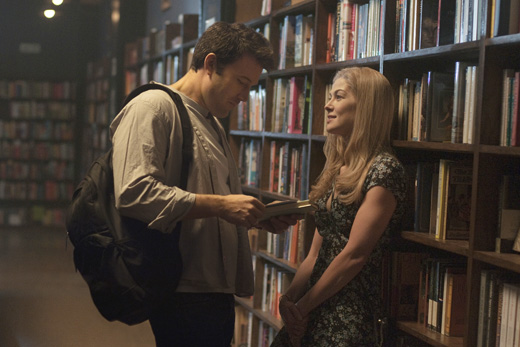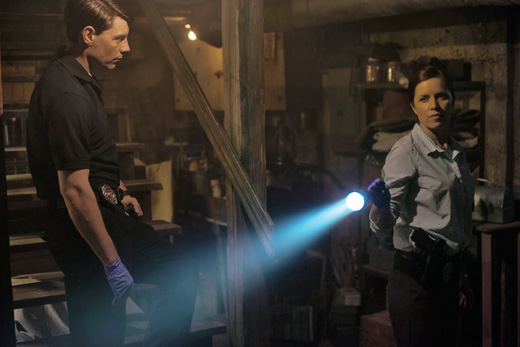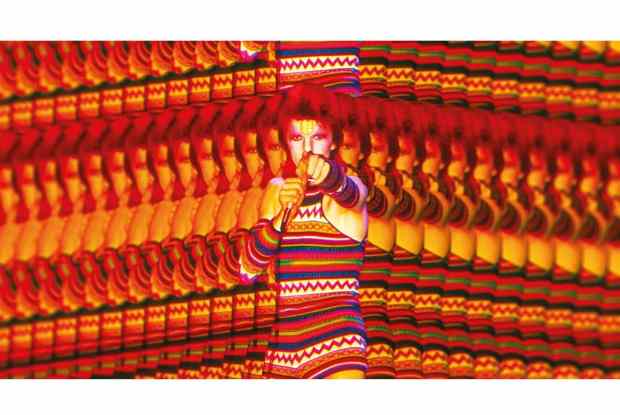Gone Girl is David Fincher’s adaptation of the bestselling thriller by Gillian Flynn, a relentless page-turner which I’ve heard people say they read ‘even though it’s not that good’ — you were hooked; get over it; don’t be snotty — and which I read, even though it’s not that good. The twists and turns are there, but all psychological heft is ultimately thrown out the window in a way you’d never, for example, find in a Patricia Highsmith. And this screen version fully exposes the limitations of the original material. In fact, the final act is so outlandishly absurd and ridiculous and trashy that Fincher plays it for laughs. Or at least I think he plays it for laughs. Actually, the worst scenario would be if he hadn’t played it for laughs. Then we’d really be in trouble.
With a script by Flynn, this is the story of a married couple, Nick and Amy Dunne, as played by Ben Affleck and Rosamund Pike. I am fond of Affleck. He is one of those actors who is always a better actor than you thought he was. This may have something to do with that all-American jaw, which says one thing, whereas his performances are significantly more subtle than such a jaw might suggest, so I find I’m always nicely surprised. Pike, meanwhile, is as coolly aloof as ever, with that cold look in her eye, but as the role demands cool aloofness, and a cold look in the eye, she may be superbly cast.

The first half of Gone Girl is the better half, by virtue of being the credible half. It opens with Nick returning home from an early morning bourbon — always a sign life isn’t going well; an early morning bourbon — to discover a smashed, upturned glass coffee table and that his wife has disappeared. Their lives up until then are told in flashback. They first met in New York where he was a men’s magazine writer and she compiled those personality quizzes for women’s magazines. (Are these quizzes claptrap? A) Yes, B)Yes, C) Yes.) They were in love and ecstatically happy but the recession hit, they lost their jobs, and relocated to his no-mark hometown in Missouri, although, I have to say, for a couple who are broke they get a pretty swanky, mansion-style house out of it, with plenty of storage, which is always important. But it’s not enough, the marriage begins to curdle, and now she is gone. Did he kill her?
Suspicion mounts, particularly after some of Nick’s secrets are revealed, and a media circus ensues. Nick is plastered all over the television, with the news anchors saying he basically did it, which made me wonder: are all their lawyers away on holiday? But that’s just picky, as befits a picky character, such as I am, and who is mostly just keeping an eye out for decent storage, and is still deeply bothered about that CCTV at the lake house. (If you see this film, answer me this: if the police had simply retrieved the CCTV from the lake house which, we had been told, recorded everything at all times, wouldn’t one person have been proved guilty and one innocent? Beyond all doubt? Game over?)

Fincher is a true master of the dark arts, you might say. His films include Se7en, Panic Room, The Girl with the Dragon Tattoo and The Social Network, which he imbued with a tension that otherwise wouldn’t have been there. Is this tense? Hard to know, for sure. Having read the book, I knew what was coming, but I suspect so. Fincher is a precise director who, as a rule — I skipped over The Curious Case of Benjamin Button on his CV for obvious reasons — understands his material and understands how to engross. So he is sure-footed, at least initially, sharply negotiating the deceptions, the betrayals, the tightening of nets, the peeling away of the Dunne’s marriage. Plus, just as satisfyingly, he pays sufficient attention to the secondary characters like Amy’s terrible parents, Nick’s twin sister and the cynical policewoman heading the investigation (Kim Dickens, who is utterly marvellous).
But then comes the major reveal, mid-way, after which it all falls hopelessly apart; after which the silliness of the narrative, with its hysterical blood-soakings and astonishingly sudden weight gains, abandons any attempt at psychological depth. At this point Nick and Amy stop being a couple whose marriage has disintegrated via petty grudges to full-on spite, as can happen, and they simply become out-and-out loons, one of whom got fat. So Fincher, perhaps sensing no alternative, particularly when no one apart from me appears interested in the CCTV at the lake house, plays out the ending for its comic value, if that is what he does. I certainly laughed, as did the audience, so heaven help us if it wasn’t his intention. Worth seeing anyhow? If you loved the book, you probably will love this, but honestly? It’s not that good…
Got something to add? Join the discussion and comment below.
Get 10 issues for just $10
Subscribe to The Spectator Australia today for the next 10 magazine issues, plus full online access, for just $10.
You might disagree with half of it, but you’ll enjoy reading all of it. Try your first month for free, then just $2 a week for the remainder of your first year.













Comments
Don't miss out
Join the conversation with other Spectator Australia readers. Subscribe to leave a comment.
SUBSCRIBEAlready a subscriber? Log in